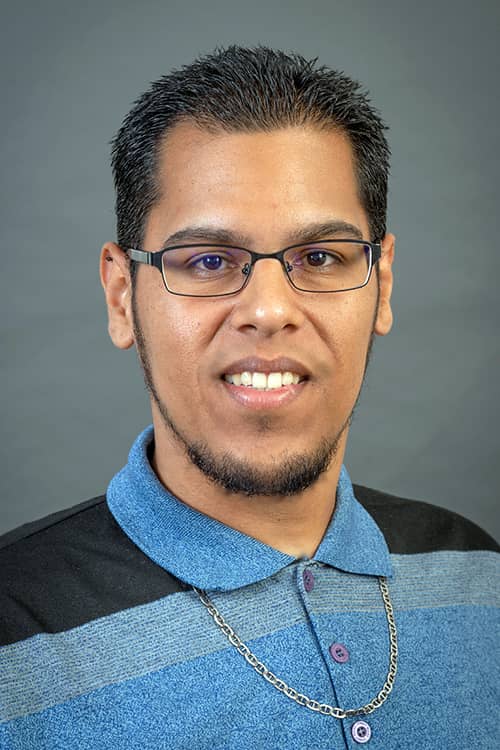
Felix Pabon-Rodriguez, Ph.D. student, Biostatistics
Models immune responses
• Hometown: Coamo, Puerto Rico
• Faculty mentor/advisor: Grant Brown, Assistant Professor, Biostatistics; and Jacob Oleson, Professor, Biostatistics
• What is your degree program and expected graduate date? Ph.D. in Biostatistics, May 2023
• Please describe your research: My research work focuses on modeling the interactions between infectious diseases and the inflammatory and regulatory components of the immune response. These responses can establish control of pathogens naturally or following an intervention/treatment such as vaccination. Our specific focus is on Visceral Leishmaniasis, which is spread by sandfly bites and affects internal organs, usually the spleen, liver, and bone marrow. If no treatment is considered, the fatality rate of the disease can be as high as 100% within 2 years. In addition, we consider possible co-infections with other pathogens. We propose a Bayesian hierarchical model that allows us to define a simple and generalizable set of parameters that predict protective immunity by using an individual host level model.
• In simple terms, why does this research matter? We have learned that one limitation in vaccination strategies is a focus on neutralizing antibodies, without incorporating broader complexities of immune responses. This project allows us to explore and evaluate the interaction between pathogens and the immune system with the main purpose of understanding the protective immunity.
• How soon after starting at the University of Iowa were you able to participate in research? I have had the opportunity to start participating in research since my first semester in the program, thanks to the Research Assistantship. In terms of the project above described, I started it in my second year as part of the preceptorship project.
• How has being involved in research made you more successful at the University of Iowa? Research has been an important part of my academic journey. It has provided me the opportunity to apply all the statistical analyses I have learned from my classes, but at the same time I have learned new concepts and techniques that you do not usually see in a classroom. In terms of skills, I have improved my analytical, programming, and communication skills, which are key in the collaborative field of Biostatistics.
• What are your career goals and/or plans after graduation? My plans after graduation are to find an academic position and provide statistical support in research projects as a consultant.
• Does your research have connections to or implications for COVID-19? Please explain. The statistical model we are proposing in our research project can be applicable to a wide variety of infectious diseases due to its generalizability. Since COVID-19 is an infectious disease caused by a newly discovered coronavirus (SARS-CoV-2), our work could potentially be extended to also consider COVID-19.
Banner location: online—
